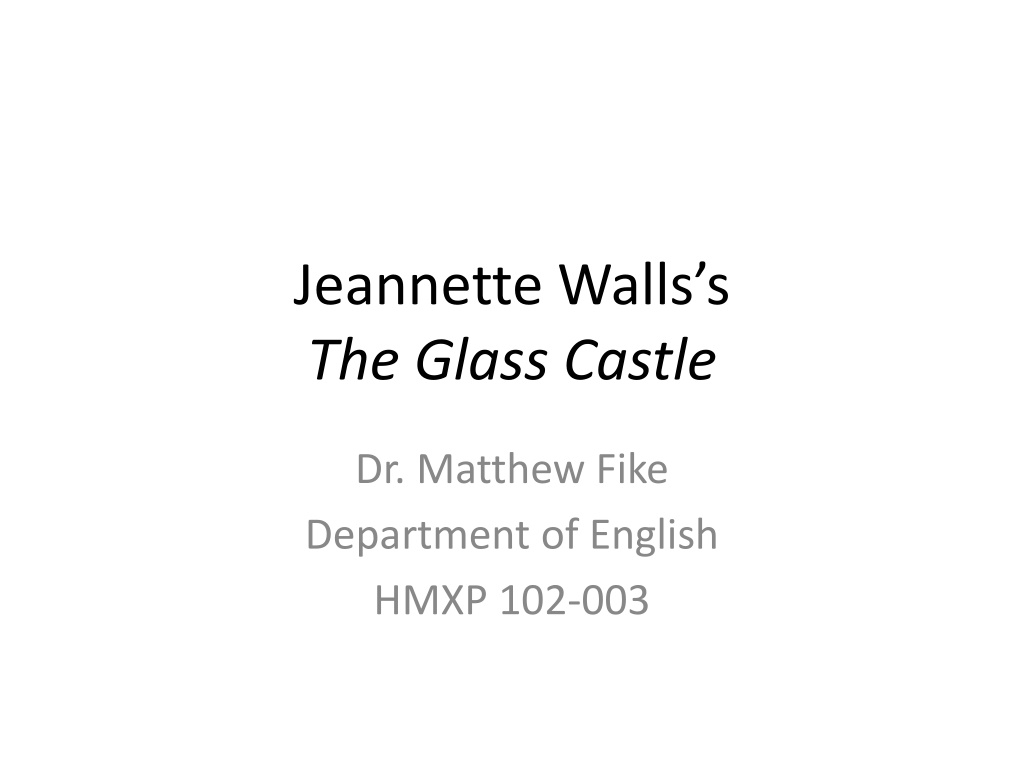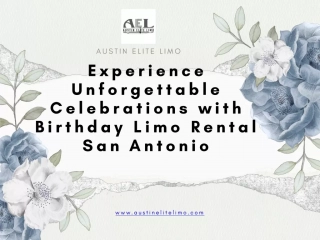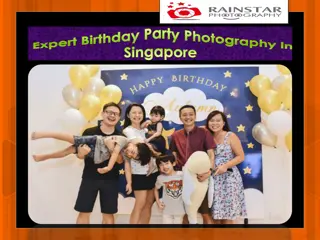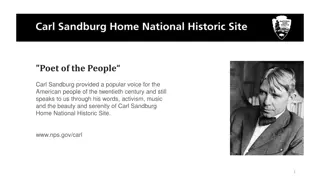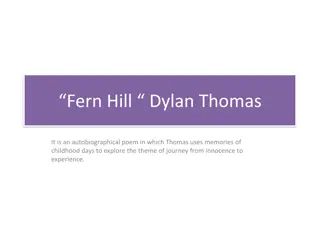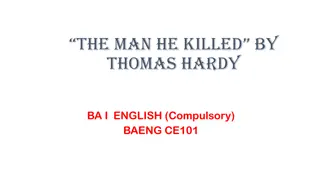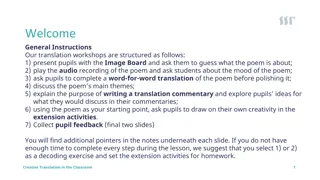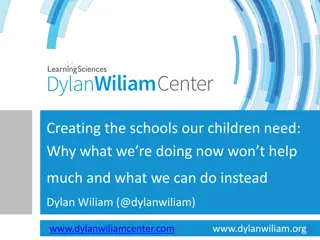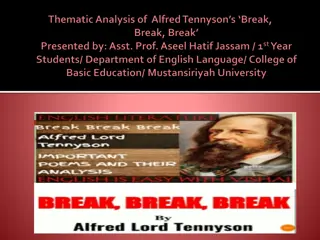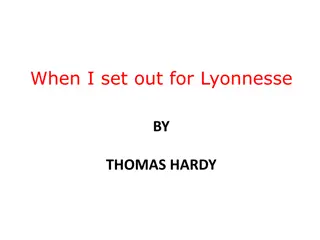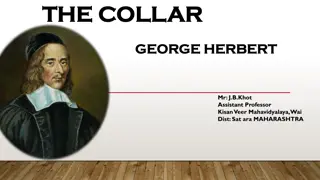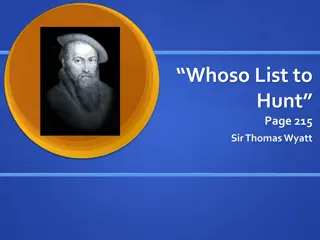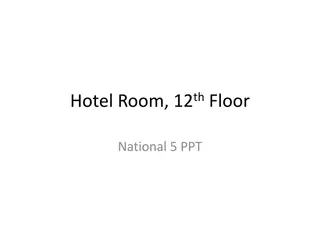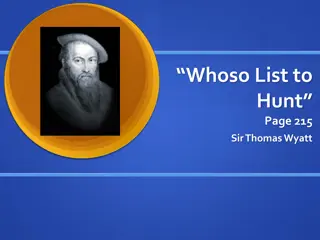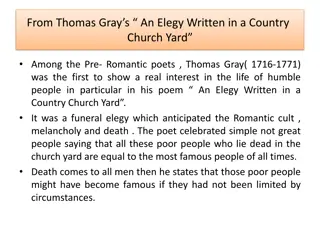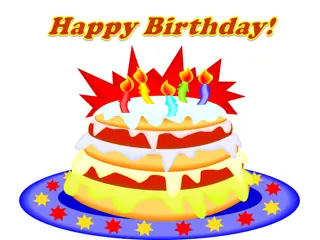Analysis of Dylan Thomas's Poem "On His Birthday
This analysis delves into Dylan Thomas's poem "On His Birthday," exploring themes of mortality, nature, and spirituality. The poem, written in 1952, reflects Thomas's contemplation of death and the eternal truths he finds in the natural world. Religious imagery and Christian references are discussed, highlighting the poet's acceptance of mortality and faith in a life beyond death.
Download Presentation

Please find below an Image/Link to download the presentation.
The content on the website is provided AS IS for your information and personal use only. It may not be sold, licensed, or shared on other websites without obtaining consent from the author.If you encounter any issues during the download, it is possible that the publisher has removed the file from their server.
You are allowed to download the files provided on this website for personal or commercial use, subject to the condition that they are used lawfully. All files are the property of their respective owners.
The content on the website is provided AS IS for your information and personal use only. It may not be sold, licensed, or shared on other websites without obtaining consent from the author.
E N D
Presentation Transcript
Jeannette Wallss The Glass Castle Dr. Matthew Fike Department of English HMXP 102-003
Outline Epigraph Structure Writing in Class Concepts Images What lies beneath Themes Parents contradictions The Glass Castle The Moral Paper topics
Epigraph as printed in TGC Dark is a way and light is a place, Heaven that never was Nor will be ever is always true From: Dylan Thomas s Poem on His Birthday
Poem on His Birthday http://plagiarist.com/poetry/1136/
Preliminary Points The poem was written in 1952, a year before his death. It continues a life-long fascination with death but conveys the feeling that his end was drawing near. He sees not only fecundity in the natural world but also the death of other creatures and recognizes that their death, like his own, is inevitable. Nevertheless, he seems to praise the Creator.
The Poem (12 stanzas) Stanza 1: The poet celebrates and spurns his 35thbirthday, watching the birds and thinking of various images of nature s mutability. Stanza 2: These reminders are personally relevant because he realizes that he Toils towards the ambush of his wounds; / Herons, steeple stemmed, bless. He journeys toward the time when there is no escaping the ills of old age. The herons, whose beaks are narrow like steeples, walk in their shroud in the next stanza (that is, they are walking reminders of the poet s mortality). In stanza 2, they bless (they bestow some kind of good; OR, more likely, they strike their prey; cf. French, blesser, to hurt). In the latter sense, the word bless is part of a strand of references to predation.
More on the Poem Religious language permeates the poem. For example, God is Him / Who is the light of old. This God is specifically Christian. In a cavernous, swung / Wave s silence, wept white angelus knells. The Angelus (an juh luh s) is a devotion in memory of the Annunciation (when the angel Gabriel tells Mary that she is pregnant with Jesus). A bell announces (knells) when it should be recited. (Knells are also typically associated with funerals.) The point: So there is a contrast between the mutable world that the poet sees with his five / Senses in a later stanza and the consolation that the Christian Heaven offers. In other words, he sees in nature not only signs of his own mortality but also reminders of a life after death. Blessings: Toward the end of the poem, he realizes that he has various blessings. Foremost among them is that the shortness of time heightens perception of nature s beauty. This blessing and his faith in God are with him as he sail[s] out to die in the last line. The poem is thus a Christian counterpart to Wallace Stevens s Sunday Morning, which is written from a nonreligious point of view, and ends with the line, Downward to darkness on extended wings (a far superior final line, by the way).
The Key Stanza And freely he goes lost In the unknown, famous light of great And fabulous, dear God. Dark is a way and light is a place, Heaven that never was Nor will be ever is always true, And, in that brambled void, Plenty as blackberries in the woods The dead grow for His joy.
The Key Stanza Thomas s stanza And freely he goes lost In the unknown, famous light of great And fabulous, dear God. Dark is a way and light is a place, Heaven that never was Nor will be ever is always true, And, in that brambled void, Plenty as blackberries in the woods The dead grow for His joy. Paraphrase by F.F. With free will he wanders confusedly Into the mysterious but renowned light Of great, myth-rich, precious God. Darkness is one path forward and light is a destination[;] Heaven that never existed [here on Earth] Nor ever will exist [here] is nevertheless true And, in that thorny emptiness [the natural world], Plentiful as blackberries in the woods The living dead mature to give God joy.
Summary of the Stanza Wayfaring: We journey through life on a dark and thorny path, but well-lit heaven is our final destination. Blackberries: The image of humans as blackberries is highly positive. We grow/mature into something ripe and desirable, thus pleasing God.
The Point Note that the poem is about how every year on your birthday you are one year closer to death. We live in a realm of toil and struggle, but heaven is our ultimate destination. This is an appropriate poem to use as a epigraph for a book that celebrates Jeannette s dead father, for it implies the hope that he is in Heaven and that she will one day be there too. So TGC is a book about finding blessings (benefits) in a world full of blessings (hurts, wounds). All the trials that Jeannette endured will not be for naught that is the epigraph s implication. Struggle is purposeful.
The Books Structure Frame: A Woman on the Street and Thanksgiving Book starts with shame re. her mother and family. Book ends with reaffirmation of mother and family. Structure: Walls states in an interview that a story has three parts. This echoes Aristotle who wrote in the Poetics that a tragedy has three parts beginning, middle, and end. The Glass Castle is similar: beginning (desert), middle (Welch), end (NYC). But since TGC is comic, not tragic, there is a nice correspondence to William Blake s stages:
The Three Main Sections Desert innocence (ignorance of life s ills; you are subject to them but unaware that you should be miserable; example: Jeannette gets burned but does not register any pain). Welch experience (awareness of life s ills; you are subject to them, are miserable, and know that life should not be as it is). NYC organized innocence (awareness of life s ills; you know that the world is flawed, but you don t let it get to you).
Illustration: Happiness Innocence: I was happy in Battle Mountain (81). But this is because she does not know any better. Experience: That summer morning I d spent swimming with Dinitia at the public pool was the happiest time I d had in Welch (199). Here she is quite aware that life is hard because Dinitia et al. have assaulted her multiple times. Organized innocence: I d never been happier in my life (248), she says regarding her first job at The Phoenix (as though she has risen from the ashes of her life in Welch). She is fully aware of her parents problems but does not let them get to her.
Application of Blakes Stages From a Youtube interview with Walls at Point Loma Nazarine University in California: Oscar Wilde: Children begin by loving their parents [the desert]; as they grow older they judge them [Welch]; sometimes they forgive them [NYC?]. This nicely illustrates the stages that Blake is talking about, and it captures the three-part structure of the book.
And Yet Perhaps forgive is what she said when the Point Loma journalism professor asked her about forgiveness. She does not see herself as a victim, thinks that her parents gave her incredible gifts, and has compassion for her mother, whom she considers a damaged woman. So the third stage is probably not forgiveness as such but more likely a wholeness that she achieves, which allows her to live and let live without recriminations.
Another Structural Point Here is another way of charting the family s trajectory. They are supposed to report to the courthouse in Phoenix (89). If they had not skedaddled, their lives might have changed for the better. Later (the climax) the family assembles in court after Maureen stabs Rose Mary (275). At last there is a kind of reckoning (an open acknowledgement [276] that there really is a problem in the family). Jeannette says: You never truly escape your past and carry these things around. The important thing, she stresses, is confronting the past in order to come to terms with what and who we really are. In other words, there has to be an inner reckoning. We must acknowledge (bring light to) the shadows that lurk within. What is repressed will fester. See next slide.
Jesus in the Gospel of Thomas If you bring forth what is within you, what you bring forth will save you. If you do not bring forth what is within you, what you do not bring forth will destroy you. TGC is an exercise in bringing forth. Writing it is part of her inner work.
Comedy vs. Tragedy Rose Mary to Jeannette: Life is a drama full of tragedy and comedy . . . You should learn to enjoy the comic episodes a little more (129). Desert: Comedy in the sense that all the misbehavior seems funny (note that a comic-strip writer from the Village Voice interviewed Rex). Welch: The potential for tragedy clearly emerges. The outer situation may sully the family members inner spirit; psychological chaos may win the game. Will the children escape the gravity field of parental dysfunction? If TGC were a tragedy, the story would end in Welch. NYC: A higher sense of comedy is achieved so that harmony, integration, and forgiveness are possible. In comedy, persons overcome problems, though sometimes just barely. Ultimately, comedy is not about laughter; it is about comic resolution, which hinges on an honest acknowledgement of problems: owning them, not letting them own you.
Writing in Class: 15 minutes On the following slide are the book s key concepts. Step 1: Spend 5 minutes copying them in your notebook. Step 2: Then underline the ones that you think are most important. Step 3: Then circle the three underlined concepts that interest you the most. Step 4: Finally, spend 5 minutes writing about TGC in terms of one of those three concepts.
Concepts Adaptability, addiction, adventure, being special, benighted sheep, brainwashing, brokenness, compassion, conformity, conservatism, employment, extroversion, fear, focus, freedom, frontier, happiness, hardship, hunger, gambling, imagination, inflation, killjoy, liberalism, luck, perversion, pioneer, positive thinking, prejudice, pride, prostitution, racism, resistance to authority, rules, self-esteem, security, self- reliance, secrets, self-sufficiency, the shadow, shoplifting, skedaddle, struggle, theft, truth, values, violence, wealth, welfare.
Discussion What did you discover about TGC in terms of your concept? End of Day One
Day Two: Causes of Brokenness Harm from something bad: Jeannette suggests that Rex is the way he is because Erma (his mother) may have sexually abused him (see 148). Re. Erma s death: Erma had seemed to have some sort of an evil hold over Dad, and I thought he d be relieved to be free of it (180). Harm from providing something good: Welfare, she said, would cause irreparable psychological damage to us kids. . . . Once you go on welfare, it changes you. Even if you get off welfare, you never escape the stigma that you were a charity case. You re scarred for life (188). Ironically, the assumption is that neglecting her children s well-being would NOT scar them for life. (Her scar is mentioned on 191: she is literally scarred for life by the fire when she was three.) Questions: How does Rex react when Erma dies? What happens when he no longer has his mother to blame for his problems? Is Rose Mary right? Does receiving public aid scar you for life? What are the alternatives? Might it actually engender a helpful humility? Is her statement a fallacy of overgeneralization?
Pride and Self-Delusion References to pride: 12, 46, 55, 73, 118, 121, 129, 134, 138, 159, 171, 225-27, 237, 239, 252, 258, 267, 269. The underscored pages specifically use pride or proud. Questions: What TYPES of pride did you notice in TGC? What is the role of pride in the family s dysfunction?
Suggestion about Pride Jeannette to her professor: But if some of them [the homeless] were willing to work hard and make compromises, they might not have ideal lives, but they could make ends meet (257). Pride is one reason they might not be willing to work. There is also the vain hope that one can make it big, strike it rich, etc. (Ironically, the gold Cadillac is the closest thing to gold that Rex ever gets.) See 171: He [Rex] was focused on striking it rich. POINT: Jeannette is giving you a formula for success in college and in your professional life: work toward your goals, don t expect to get everything you want instantly, be willing to make compromises.
Hatred of Cops and Resistance to Authority Question: Is pride the origin of Rex s hatred of all authority? Where does that hatred come from? Does it come perhaps from his relationship with his mother? 48: Car chase, gestapo. 50: A cop would be hauling your asses off to jail. 88-89: Cop comes to their house in Battle Mountain after the shooting incident. 106: Police shoot a mountain lion in Phoenix. 109: Security guards at the Phoenix zoo. 118: Rangers at the Grand Canyon. 205: Parents suspicious of all cops. 255: Cops wake them up in NYC. 262: Cop breaks up a fight between Rex and Rose Mary in Phoenix. 267 Resistance to housing agency ( battling authority ). 275: Father picks fights with security guards at court.
Images Geode: 60, 90 125, 152, 183, 239. Knives: Dinitia fatally stabs her mother s boyfriend (200), Rex uses knife to cut piggy bank (228), Rex gives knife to Jeannette (240), and Maureen stabs mother (275). Venus: 40, 247, 281. Fool s gold/iron pyrite: 59. Snake biting its tail: 207. Gold Cadillac: 224. Caryatid: 208. Drowning woman: 195. Question: Why are these significant images in TGC?
A Key Image: Fire 9ff.: Jeannette is injured by fire (in this episode, she gains consciousness; see also the Prometheus myth). 15: Fascination with fire. 33-34: Jeannette lights toilet paper; motel burns; she wonders if the motel fire had been out to get her for flushing the burning TP (participation mystique, attributing a human psychological characteristic to something inanimate; this is very typical of innocence, her early point of view). 115: Father lights Christmas tree on fire. 147: Erma fears kids will burn the house down. 178: Kerosene as fire-starter in Welch. 183: Uncle Stanley burns down his parents house. 253: Father sets room on fire. Question: What is the significance of all the references to fire?
Images of Things That Lie Within/Beneath Geode: 60, 90 125, 152, 183, 239. (See inner spirit on 104, inner beauty on 245 vs. outward appearance.) Termites: 101. Phoenix house is internally unsound. On 101 father patches holes with metal from beer cans: this is cosmetic like putting a Bandaid on a tumor. Parallel to father s deterioration physically and psychologically. Cash jar: 17. It is buried somewhere.
What Lies Within? Monster: Father when drunk turns into an angry-eyed stranger (23). Where does this come from? It is in all of us. But it is buried in a part of the mind that we hide. The shadow. Violence: On 71 Rex tries to kill Rose Mary. They battle in Battle Mountain. They have another fight on 122ff. Jeannette shoots at Billy Deel on 88. Maureen inner life: imaginary friends on 81, 111; bogeymen on 103. Questions: Does alcohol impose violence on a drunk, or does it merely unlock it? What kind of darkness lies within? Do you have experience with imaginary friends? Why don t you see them now? (See CU.)
Major Theme: Turbulence and Order 61: the boundary between turbulence and order. There is the image of the invisible shimmery heat above a flame or over the desert. It s a place where no rules apply. 261: the transition between order and turbulence . . . turbulence was not in fact random but followed a sequential spectrum of varying frequencies. If every action in the universe that we thought was random actually conformed to a rational pattern, Dad said, that implied the existence of a divine creator, and he was beginning to rethink his atheistic creed. (Here science and faith begin to work together. The statement implies that there was purpose in her chaotic upbringing.) 288: A wind picked up, rattling the windows, and the candle flames suddenly shifted, dancing along the border between turbulence and order. (This seems to be the sweet spot where personal growth is possible, between ease and hardship.) Question: How do you read TGC in light of this theme?
Tensions: Conflicting Value Systems Realism vs. inflation (thinking you are great). City vs. wilderness: 34: These cities will kill you, he said. 106: He felt it was good for your soul to have buzzards and coyotes and snakes around. (106) Rules vs. freedom. Instruction in self-sufficiency vs. child abuse. respect[ing] your parents (119) vs. enabling their addictions.
Another Major Theme: A Generational Swing to the Opposite 27: Rex and Rose Mary have to get away from their mothers ; Rose Mary becomes very unlike her mother. 59: Mom believed that children shouldn t be burdened with a lot of rules and restrictions. 73: She thought rules and discipline held people back and felt that the best way to let children fulfill their potential was by providing freedom (73). This is Rose Mary s educational philosophy. 73-74: Grandma Smith had forced Jeannette s mother to get a teaching degree; she d really wanted to be an artist. 91: Grandma Smith s rules for Rose Mary vs. the latter s never setting rules for her children. 100: Jeannette suggests roach spray. 262ff., 274: Brian becomes a cop 262ff., 274. 268: In her first marriage, she wound up with a man [Eric] who was exactly the opposite [of her father]. 286: Brian renovates houses 286. He does to places in NYC what Rex never did in Welch. Jeannette lives on Park Avenue and writes about the rich and famous. Question: Why does a generational swing happen? How does Jeannette get out of this cycle? (Think about her husbands.) [violation of free will & Oedipal hatred]
Parents Contradictions God helps those who help themselves (113), which Jeannette s parents do not do. Father s stories: On 25 there is heavy inflation about himself, and a tall tale appears on 37. Yet the kids are not allowed to believe in Santa on 39. Father writes to the dictionary people but gets the definition of Immaculate Conception wrong on 114. (It means that Mary was conceived without sin; the virgin birth refers to Jesus s conception without sexual intercourse.) Question: Can you think of others? (These are the kinds of things that trouble people in the experience stage.)
The Glass Castle The Glass Castle is mentioned on 25: First mention of. Financing it requires finding gold 83: Mentioned. 152, 155, 157: Hole for foundation of TGC filling up with garbage. 238: Blueprints for. 279: Never got built. Similar images: Lori sees NYC as a sort of Emerald City (223). The diamond ring they find on 186, the rings Jeannette sells. Geode would sparkle like a diamond on 238. When Jeannette gets her own home, it is a sturdy farmhouse made of solid wood and stone. It is not glass or emerald or diamond; but it is what she needs, and it suggests that she is on solid ground in her psychological life and in her marriage. Jeannette in an interview: TGC is one of my father s drunken promises or hope for the future ; it is whatever you choose to make of it (a symbol). Question: What do you think the Glass Castle represents?
A Possible Interpretation The glass castle never gets built, but it conveys psychological truths about the Walls family. It represents, for example, Rex s tendency to focus on unobtainable dreams (the castle, the inventions, striking gold) and to ignore the immediate need to fix the house in Welch, WV. It is where the Wallses would live if Rex were to strike it rich (171). But in the absence of that kind of good fortune, it symbolizes his inflation.
Writing in Class: The Moral Lesson Write down what you believe the book s moral to be? (A moral is a short statement of the main point that one is supposed to take away from the experience of reading the book.)
A Possible Answer Page 256: I think that maybe sometimes people get the lives they want.
Paper Topic Values: In her interview at Point Loma Nazarine University (available on Youtube.com), Jeannette (mis?)quotes Oscar Wilde as stating, A necessity is a luxury once sampled. Another version of the statement is A luxury once tasted becomes a necessity. (The Internet assigns the statement and others like it to various people, so who knows who originally said it?) Her point is that we think that we cannot survive without things we have grown accustomed to. Did reading The Glass Castle help you see any of your values in a different light? Is anything that you always considered a necessity really a luxury? Here is a great opportunity to make a connection to Brian Swimme s piece on consumerism. (For values see TGC, pages 269.)
Paper Topic Science vs. religion: Jeannette makes statements about science and religion on pages 104-05 and 261. Can you embrace religious faith AND reason/science? Of course, science and religion start from very different assumptions, which are mutually exclusive, or are they? Using connections to Jeannette s book and a narrowly focused experience of your own, explain where you stand on a spectrum ranging from science s materialism to religion s emphasis on things not seen. Where does the author stand vis- -vis science and religion?
Paper Topic City life vs. wilderness: Rex Walls, for all his problems, loved nature. These cities will kill you, he said (34). Later, Jeannette writes a paragraph that begins, Dad missed the wilderness, in which she develops her father s biophelia (106; see also the top paragraph on 185). Later, of course, working in untamed country in upstate New York seems to do him some good versus the temptations of NYC (262). On the other hand, one might argue that a couple of days in the desert would be more likely to kill you than life in the city. Using an example from your own experience, engage with Rex s view and its opposite in order to inquire into your own environmental ethic. Will cities really kill you? If so, in what sense?
Paper Topic Harm vs. benefit: To a large extent, The Glass Castle is a book about growing up while living in a state of neglect (193). Yet Jeannette suggests that a hardship that one considers a curse may become a blessing in later life. As her mother says, What doesn t kill you makes you stronger (179). Believe it or not, Jeannette even states in her Point Loma Nazarine interview that her parents gave her incredible gifts. In the same interview, she mentions a specific example, how her father pimped her out in a bar. She calls it the worst experience of my life . . . but also the best experience of my life. What is the worst experience in your life? Is there something in your own life that seemed like a curse at the time but is in retrospect a blessing? How might a Wallsian approach shed a positive light on a dark moment in your life?
Paper Topic Victim vs. perpetrator: When Jeanette is sexually assaulted by Uncle Stanley, her mother tells her that sexual assault was a crime of perception and that her uncle was so lonely (184). Think about a time when someone harmed you in some way. Then think compassionately about why s/he might have done that. For example, maybe you were bullied, as Jeannette was by Dinitia Hewitt. Does Jeannette s awareness to the ills in Dinitia s life have a corresponding realization about your own antagonist?
Paper Topic Pride: This concept, which Christians consider a deadly sin, is a major theme in TGC. See the earlier slide that lists all the page numbers where pride rears its head. In that context, consider how your own pride may (or may not) have been a problem for you in a specific situation. For example, have you ever resisted authority just for the heck of it? Note that a preceding slide deals with cops and other authority figures. END
